
Effective keyword research is the foundation of any successful SEO strategy, but finding high-impact terms without a budget can be a major hurdle. This guide solves that problem by showing you how to leverage the power of free AI tools.
We provide a clear, step-by-step process to help you discover relevant keywords, understand search intent, and optimize your content effectively. Get ready to boost your website’s visibility and drive meaningful organic traffic, starting today.
Why Use Free AI Keyword Generators for Your SEO Strategy?
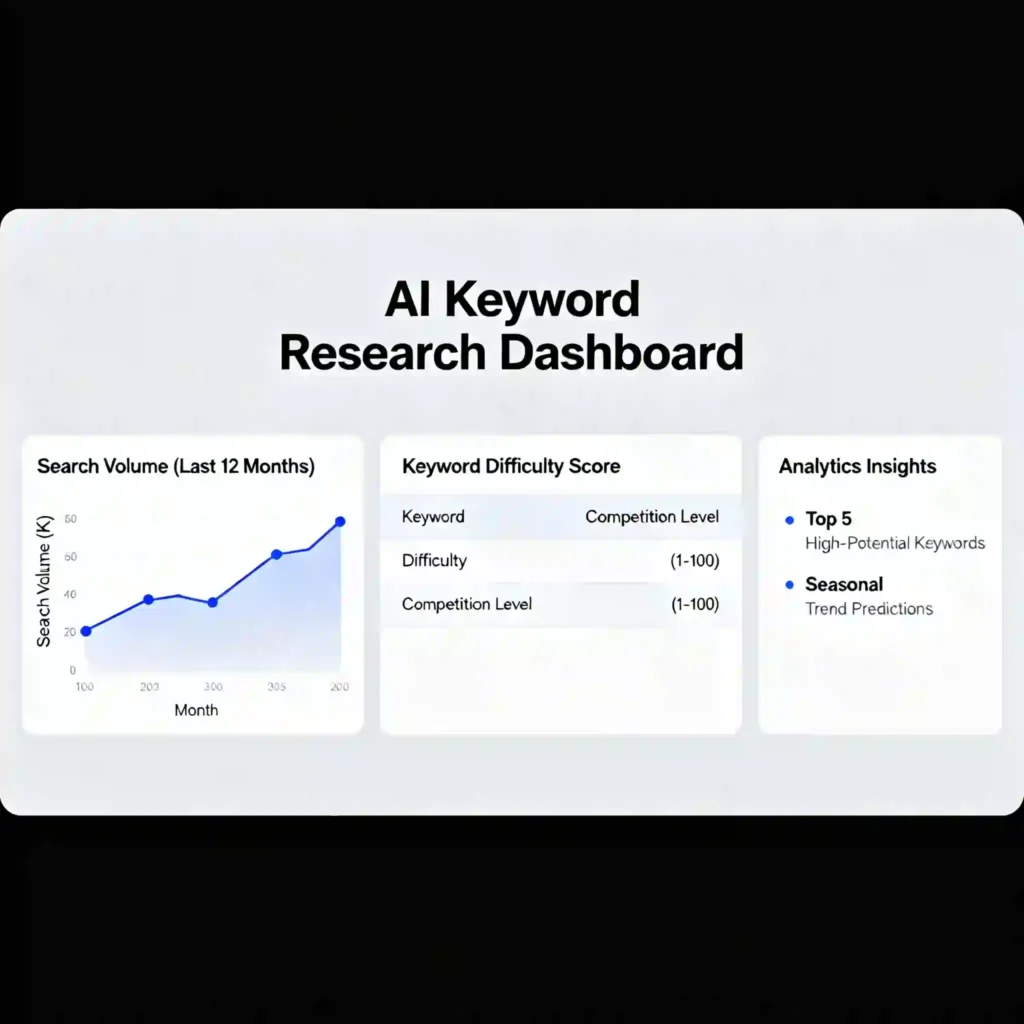
Free AI keyword generators are essential for a modern SEO strategy because they offer a data-driven advantage. Unlike traditional methods that rely on manual research, AI-powered tools analyze massive datasets to deliver high-impact keywords, helping you create content that aligns perfectly with user intent and search engine algorithms. This automated approach allows you to stay ahead of competitors by working smarter, not harder.
Save Time and Effort with AI Keyword Analysis
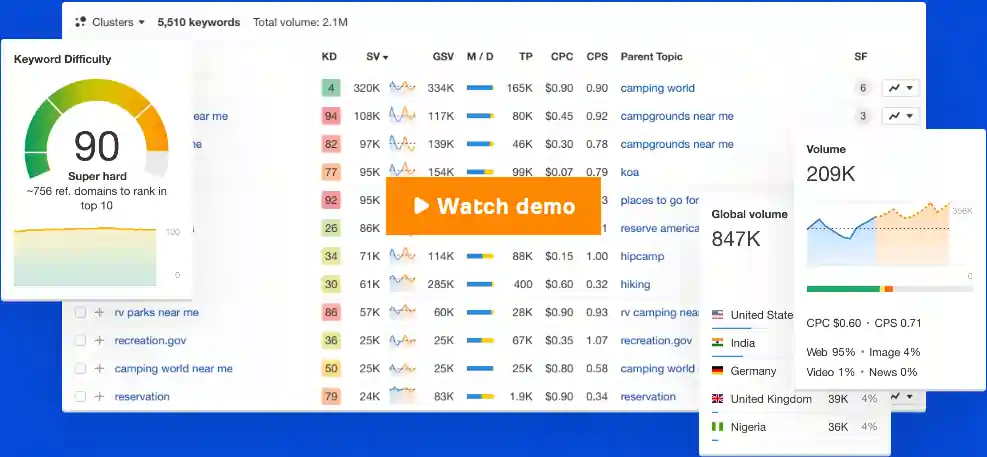
- Automate Keyword Discovery: An AI keyword generator automates the time-consuming task of brainstorming and researching keywords, instantly providing hundreds of relevant suggestions.
- Streamline Your Workflow: These tools quickly process and analyze data, freeing up your time to focus on creating high-quality content instead of getting lost in spreadsheets.
- Get Instant Insights: AI delivers immediate analysis on keyword potential, including search volume and competition, helping you make faster, more informed decisions.
Uncover Profitable Long-Tail Keywords for Free
- Find Niche Opportunities: Free AI tools excel at identifying long-tail keywords—longer, more specific phrases that are often less competitive and have higher conversion rates.
- Target High-Intent Users: AI helps you find keywords that match what users are actively searching for, connecting you with an audience that is closer to making a decision.
- Gain a Competitive Edge: Many competitors overlook these specific, low-volume keywords, giving you an opportunity to rank for terms they have missed.
- Adapt to Search Engine Updates with AI Tools
- Stay Aligned with Algorithms: AI tools are designed to learn and adapt to frequent search engine algorithm updates, ensuring your keyword strategy remains effective.
- Understand Search Trends: AI analyzes real-time search patterns and emerging trends, allowing you to optimize for what’s popular right now.
- Future-Proof Your SEO: By leveraging AI, you can create a more agile and resilient SEO strategy that evolves with the digital landscape, keeping your content relevant over time.
Getting Started: Your First Steps with AI Keyword Research
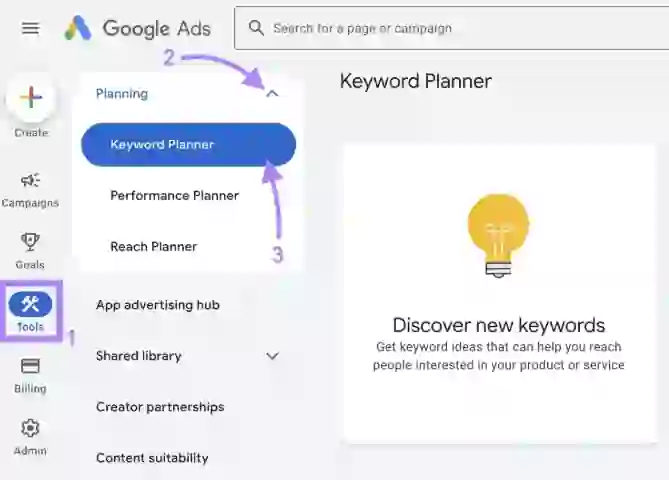
Diving into AI keyword research is straightforward and can quickly enhance your SEO efforts. This section provides your first steps, from generating initial ideas to finding untapped keyword opportunities. By following this process, you can build a strong foundation for a content strategy that drives organic traffic.
How to Use an AI Keyword Generator for Initial Ideas
- Begin with Seed Keywords: Start by entering broad “seed” keywords related to your topic into a free AI keyword generator. For instance, if you sell handmade soap, your seed keywords could be “natural soap” or “artisan soap.”
- Explore AI-Generated Suggestions: The tool will instantly provide a list of related terms, long-tail variations, and questions people are asking. Review this list to identify a wide range of potential content ideas.
- Broaden Your Scope: Use AI to brainstorm different angles. Ask it for synonyms, related problems, or alternative solutions to expand your keyword list beyond the obvious.
- Understanding Search Intent with Free AI SEO Tools
- Analyze Keyword Types: AI tools can help categorize keywords by search intent—informational (“how to make soap”), commercial (“best natural soap”), transactional (“buy handmade soap”), or navigational (“brand name soap shop”).
- Align Content with Intent: Create content that directly answers the user’s query. If the intent is informational, write a helpful guide. If it’s commercial, create a comparison or review.
- Improve User Engagement: Matching search intent reduces bounce rates and signals to search engines that your page is a valuable resource, which can improve your rankings.
Finding Low-Competition Keywords Your Competitors Miss
- Filter by Keyword Difficulty: Many free AI tools offer a Keyword Difficulty (KD) score. Focus on keywords with a lower score, as they are typically easier to rank for, especially for newer websites.
- Look for Untapped Questions: Use AI to find questions that your target audience is asking on forums like Reddit or Quora. These often represent low-competition keyword opportunities.
- Perform a Content Gap Analysis: Some tools can help you identify keywords your competitors are ranking for, but you are not. This is an effective way to find strategic opportunities to “fill the gap” and capture more traffic.
The Best Free AI Keyword Research Tools in 2025
Selecting the right free AI keyword research tools can significantly improve your SEO results. While many premium options exist, several powerful and free tools provide the data you need to build a competitive keyword strategy. This section highlights the top free AI tools of 2025, chosen for their specific strengths in keyword analysis.
Free AI Tool #1: Ubersuggest for In-Depth Keyword Metrics
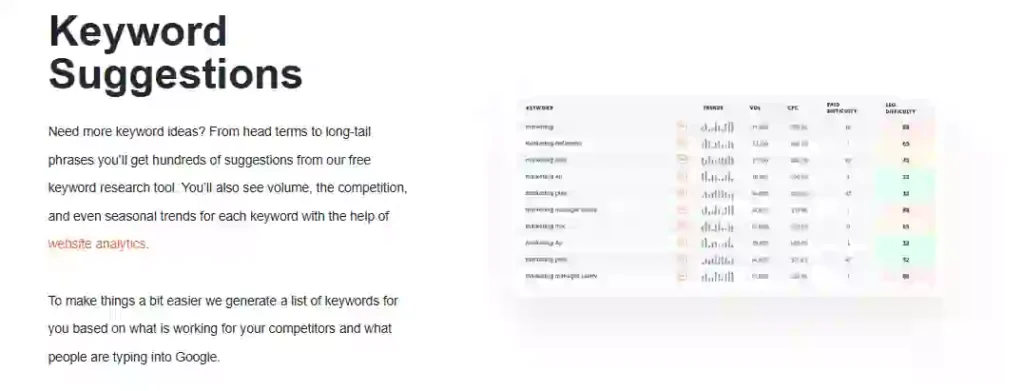
- Comprehensive Data for Free: Ubersuggest’s free AI tool is excellent for gaining in-depth keyword metrics. For any keyword, it provides key data points such as monthly search volume, SEO difficulty, paid difficulty, and cost-per-click (CPC).
- Content and Keyword Ideas: Beyond metrics, it generates a list of keyword variations and content ideas based on top-ranking articles for your term. This helps you understand what type of content performs well.
- User-Friendly Interface: Although the free version limits daily searches, the platform is easy to navigate, making it a great starting point for beginners who need detailed insights without feeling overwhelmed.
Free AI Tool #2: Semrush for Competitor Keyword Analysis
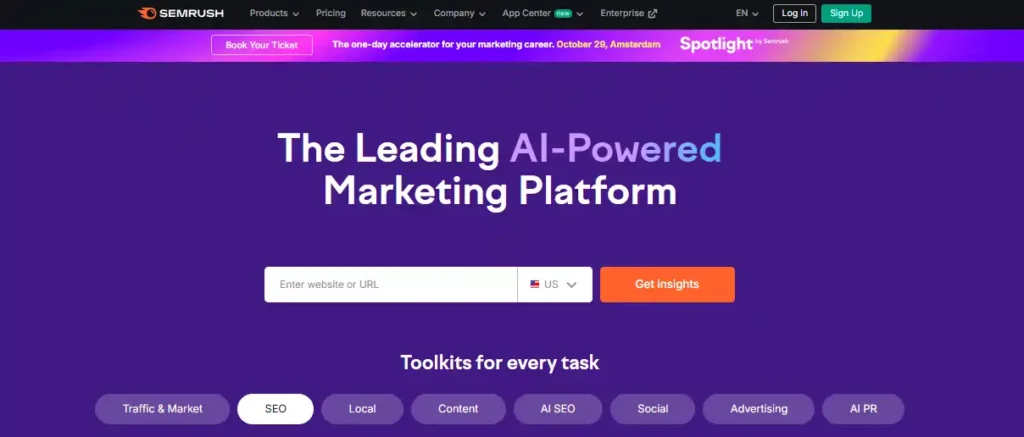
- Identify Keyword Gaps: Semrush’s free plan offers powerful features for competitor keyword analysis. Its Keyword Gap tool allows you to compare your website against competitors to find “missing” keywords they rank for, but you don’t.
- Reverse-Engineer Success: You can use the tool to see the exact keywords that drive traffic to a competitor’s domain. This allows you to reverse-engineer their SEO strategy and find proven keyword opportunities.
- Strategic Advantage: Focusing on these keyword gaps gives you a strategic advantage, helping you capture traffic from relevant terms you may have otherwise missed.
Free AI Tool #3: AnswerThePublic for Finding Question-Based Keywords
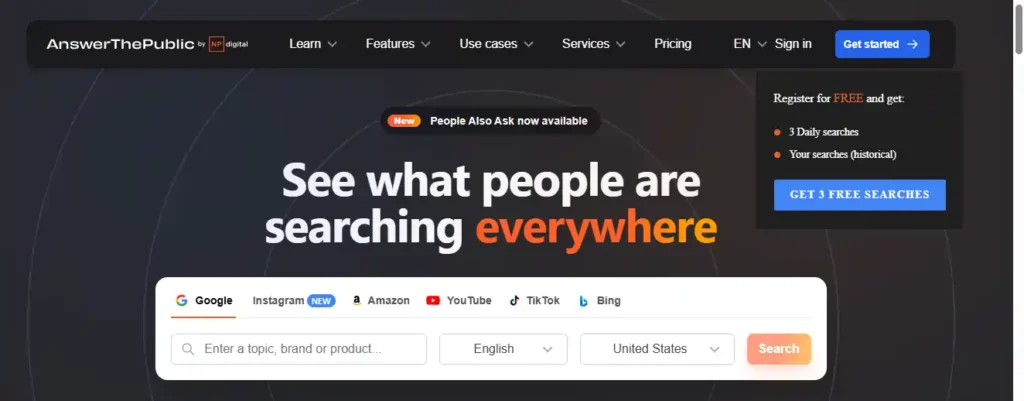
- Find User Questions: For finding question-based keywords, AnswerThePublic is an invaluable free AI tool. It takes your seed keyword and visualizes the questions people are asking about it online, organizing them into categories like “what,” “how,” and “why”.
- Create Audience-Centric Content: These questions provide direct insight into your audience’s pain points and interests, helping you create highly relevant content that directly addresses their needs.
- Capture Featured Snippets: Targeting these question-based keywords increases your chances of being featured in Google’s “People Also Ask” sections and capturing valuable featured snippets in search results.
A Step-by-Step Guide to Using Free AI Tools for Keyword Research
Using free AI tools for keyword research transforms a complicated task into a structured and efficient process. This step-by-step guide walks you through brainstorming initial ideas, analyzing their potential, and integrating them into your content to build topic authority and boost your SEO performance.

Step 1: Brainstorming Seed Keywords with AI Suggestions
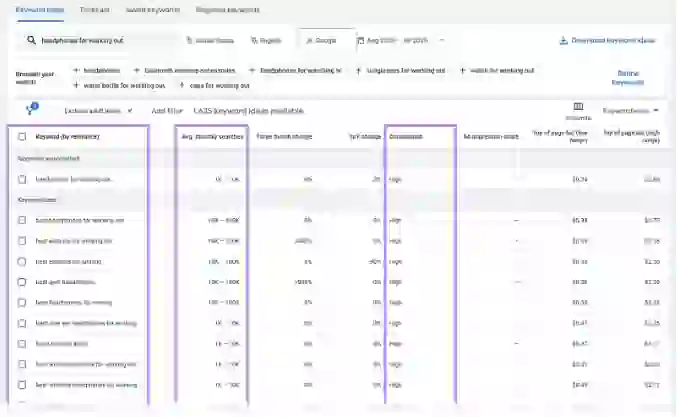
- Start with Your Core Topics: Begin by identifying your “seed” keywords—broad, one or two-word terms that define your niche or topic. For example, if your article is about indoor gardening, your seed keywords might be “houseplants” or “indoor plants.”
- Generate Ideas with an AI Tool: Input your seed keywords into a free AI keyword generator. The tool will instantly produce an extensive list of related terms, including long-tail keywords (more specific phrases) and popular questions your audience is asking.
- Expand Your List: Use AI prompts to explore different angles. For instance, ask the AI for “synonyms for houseplants” or “common problems for indoor gardeners” to uncover a wider range of relevant topics.
Step 2: Analyzing Keyword Difficulty and Search Volume

- Understand Key Metrics: Once you have a list of keywords, you need to analyze two critical metrics: Search Volume (how many people search for the keyword per month) and Keyword Difficulty (KD) (how hard it is to rank on the first page of Google).
- Prioritize Low-Competition Keywords: Use a free tool that offers these metrics, and filter your list to find keywords with a healthy search volume and a low KD score. For new websites, targeting keywords with lower competition is a more effective strategy for gaining initial traction.
- Select Your Primary Targets: From your filtered list, choose the keywords that are most relevant to your content goals. These will become the primary and secondary keywords you build your article around.
Step 3: Creating Keyword Clusters for Topic Authority
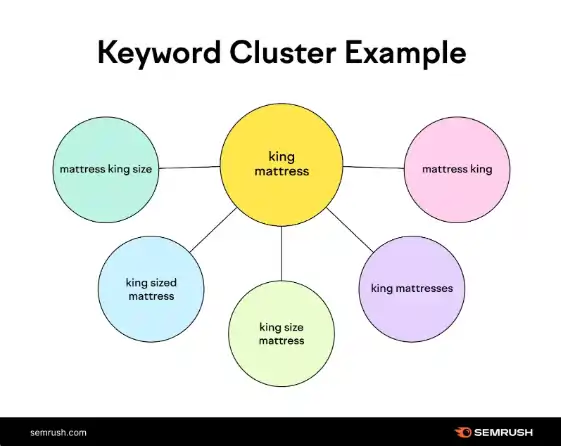
- Group Related Keywords: Keyword clustering involves grouping semantically related keywords into small, targeted clusters. For example, “how to water succulents,” “best succulents for low light,” and “succulent soil mix” could form a “succulent care” cluster.
- Use AI to Automate Clustering: Many AI tools can automate this process. You can use a prompt like, “Group these keywords into logical clusters based on search intent,” to have the AI organize your list for you.
- Build Topical Authority: Creating content around these clusters, rather than single keywords, demonstrates expertise and “topic authority” to search engines. This helps you rank for a wider range of related search terms.
Step 4: Integrating AI-Generated Keywords into Your Content
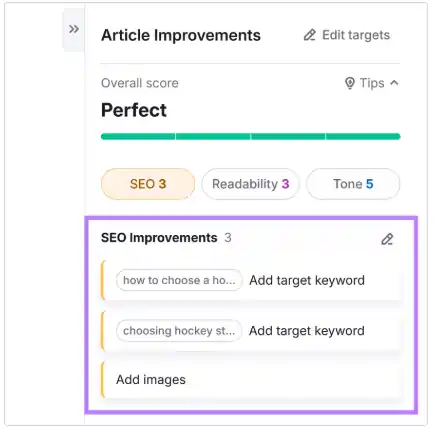
- Place Keywords Strategically: Integrate your primary keyword into your article’s title (H1), meta description, and the first paragraph. Use secondary and related keywords in your subheadings (H2s and H3s).
- Write for Humans, Not Robots: Sprinkle your keywords naturally throughout the body of your content. Avoid “keyword stuffing,” as search engines prioritize content that is readable and provides a good user experience.
- Use Variations to Add Context: Weave in long-tail keywords and questions from your research to create comprehensive content that fully answers the user’s search intent. This practice can also help you capture featured snippets in search results.
Advanced Tips for Maximizing Your Free AI Keyword Tools
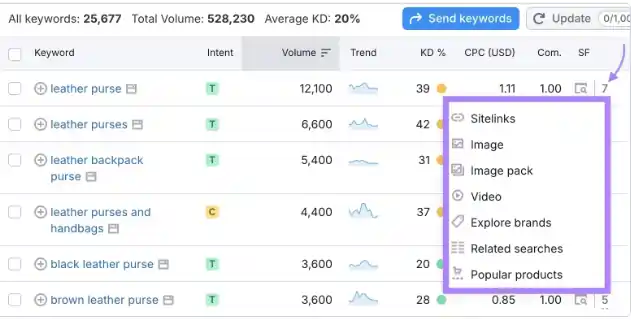
Once you have mastered the basics, you can use advanced techniques to get even more out of your free AI keyword tools. These strategies will help you uncover creative keyword opportunities, validate your data for better results, and maintain your SEO performance over time.
How to Use AI Prompts for Creative Keyword Ideas
- Go Beyond Basic Inputs: Instead of just entering a seed keyword, use more detailed prompts to unlock creative ideas. For example, ask your AI tool to: “Act as an SEO expert and generate 15 long-tail keywords for a blog post about ‘sustainable fashion’ targeted at millennials”.
- Brainstorm Different Angles: Use prompts to explore user pain points, common misconceptions, or comparisons. A prompt like, “What are the biggest challenges people face when starting a vegetable garden?” can reveal a host of valuable, problem-focused keywords.
- Discover “Shoulder Niches”: Ask the AI to identify related topics or “shoulder niches.” For instance, if your core topic is “fitness,” a shoulder niche could be “mental wellness” or “healthy eating.” This helps you broaden your content strategy and attract a wider audience.
Combining AI Tools with Google Keyword Planner for Better Results
- Validate Search Volume: While AI tools are excellent for generating ideas, Google Keyword Planner provides some of the most accurate search volume data since it comes directly from Google. Use your AI-generated keyword list and run it through Keyword Planner to verify search demand.
- Get CPC and Competition Data: Keyword Planner is designed for advertisers, so it provides valuable data on cost-per-click (CPC) and competition levels. This information can help you gauge the commercial intent and value of a keyword, even if you are only focused on organic SEO.
- Create a Hybrid Workflow: Use free AI tools for the creative, brainstorming phase and then switch to Google Keyword Planner for the analytical, data-validation phase. This hybrid approach combines the strengths of both, leading to a more robust and data-driven keyword strategy.
Tracking Your Keyword Rankings and Adjusting Your Strategy
- Monitor Your Performance: SEO is not a one-time task. After publishing your content, use a free rank-tracking tool to monitor your position in search results for your target keywords. Many SEO tool suites offer free versions with limited tracking capabilities.
- Identify What’s Working: By tracking your rankings, you can identify which keywords and content pieces are driving the most traffic. This helps you understand what resonates with your audience and search engines, allowing you to double down on successful topics.
- Adapt and Optimize: Search trends and algorithms are constantly changing. If you notice a drop in rankings, it may be time to revisit your keyword research and refresh your content with new, AI-generated terms to stay relevant and competitive.
Frequently Asked Questions (FAQs) About Free AI Keyword Tools
Can ChatGPT Be Used for Effective Keyword Research?
Yes, ChatGPT is excellent for brainstorming keyword ideas, generating long-tail variations, and identifying user intent. However, it lacks real-time search volume and competition data.
What is the Best Free AI Keyword Generator for Beginners?
For beginners, Ubersuggest is a great choice. It offers a user-friendly interface with essential metrics like search volume and keyword difficulty, making it easy to start.
How Do I Know if My AI-Generated Keywords Are Effective?
Track your website’s organic traffic and keyword rankings after publishing content. An increase in traffic and higher rankings for your target terms indicate your keywords are effective.
Supercharge Your SEO with Free AI Keyword Tools
Track your website’s organic traffic and keyword rankings after publishing content. An increase in traffic and higher rankings for your target terms indicate your keywords are effective.
Supercharge Your SEO with Free AI Keyword Tools
In today’s competitive digital insudtry, leveraging free AI keyword tools is no longer just an option—it is a necessity for an effective SEO strategy. By automating the time-consuming process of keyword research, these tools empower you to quickly identify low-competition opportunities, understand user intent, and create content that ranks higher on search engines.
Embracing the step-by-step process outlined in this guide will allow you to save time, make data-driven decisions, and ultimately drive more organic traffic to your website. Start using these powerful free tools today to supercharge your SEO efforts and achieve your content marketing goals.


